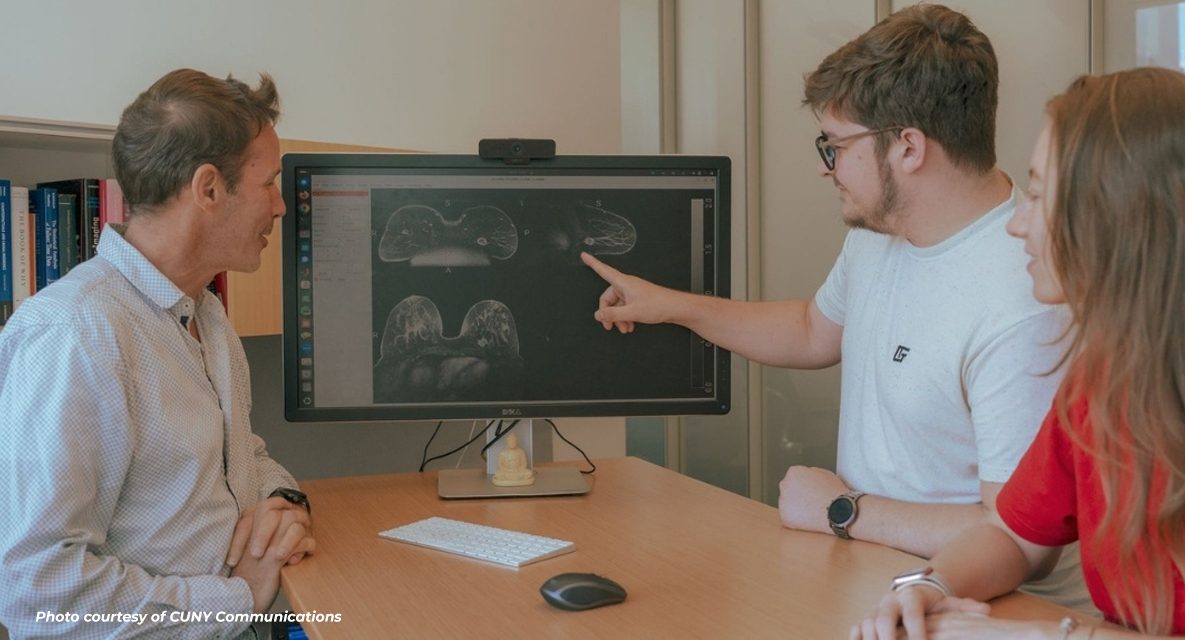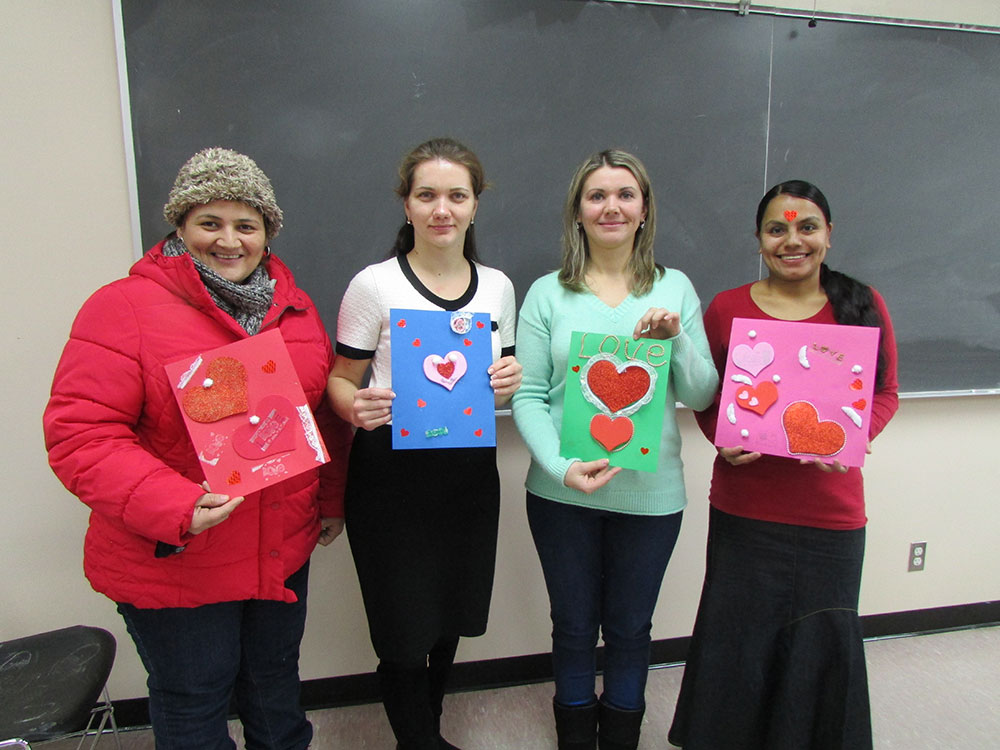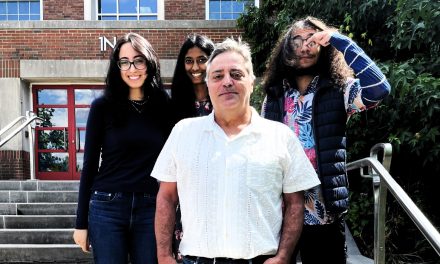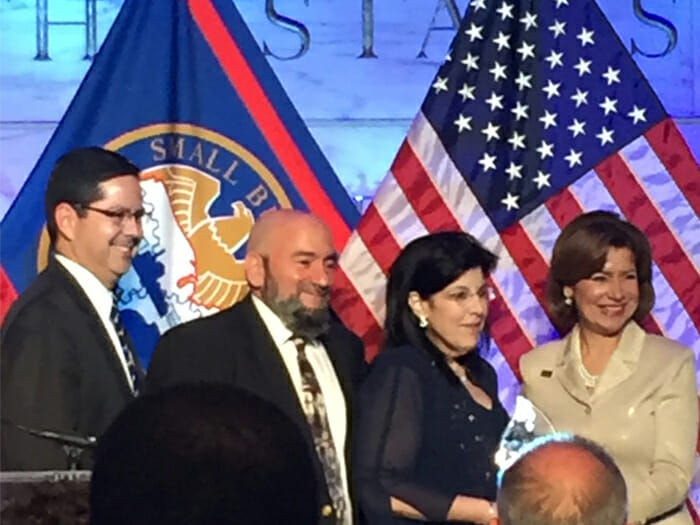Researchers at City College Recently Unveiled AI Tool to Pinpoint Tumors Earlier
Hunter College Molecular Biologist Is Making Advances in Targeting Triple-Negative Breast Cancer, one of the Deadliest Forms of the Disease
University-Wide Events Increase Awareness Through Outreach and Education
To mark Breast Cancer Awareness Month, CUNY is honoring its many researchers making progress in breast cancer studies to benefit the public good through influential work related to diagnosis, treatment and advocacy.
At the City College of New York, researchers working with Memorial Sloan Kettering Cancer Center have developed a cutting-edge AI tool that detects tumors in breast MRIs with expert-level accuracy, potentially identifying cancer up to a year earlier. City College is also partnering with the hospital on a 24-year-old program that trains students in biomedical research and aims to improve cancer health disparities in socioeconomically disadvantaged populations.
At Hunter College, molecular biologist Jill Bargonetti, whose research has drawn more than $15 million during her three decades at the school, is advancing targeted therapies for aggressive triple-negative breast cancer. And at The College of Staten Island, Professor Donna Gerstle operates the Staten Island Breast Cancer Research Initiative, which combines research, education and outreach to improve outcomes throughout the borough, which has some of the highest breast cancer rates in New York City.
“CUNY’s exceptional scholars are doing cutting-edge research that will support better diagnosis and treatment of this deadly disease, which 1 in 8 women in the United States have a chance of developing,” said CUNY Chancellor Félix V. Matos Rodríguez. “This is one of many ways that our public interest research is pursuing advances that improve the quality of life for New Yorkers.”
“CUNY faculty are pursuing a wide range of early detection tools and innovative treatments to battle a disease that has ravaged the lives of women for far too long,” said CUNY Associate Vice Chancellor and University Vice Provost for Research Rosemarie Wesson. “It is truly inspiring to see the advancements that our researchers have made in breast cancer research.”
AI Model Could Save Lives
A research team from City College worked with Memorial Sloan Kettering Cancer Center (MSKCC) to develop an open-source AI model that is publicly available to encourage evaluation, experimentation and improvement through machine learning. The tool can detect breast cancer in MRI images and pinpoint the location of tumors with accuracy comparable to expert radiologists. Their findings were released this June in the journal Radiology: Artificial Intelligence. The AI model was developed using tens of thousands of breast MRI images collected between 2002 and 2019 at MSKCC, an exceptionally large data sample when compared to previous studies. The tool supports earlier detection, especially for women with a higher risk of breast cancer, who are recommended for MRI screening.
The lab of Lucas C. Parra, professor of biomedical engineering at City College and co-head of the project, published findings that the same tool could detect breast cancer on MRI scans up to a year before clinical diagnosis, showing the potential to increase early detection by up to 30% in high-risk patients. “We’ve shown that for a fraction of high-risk women, cancer can be seen on MRI a year earlier than it typically would have been identified — this potentially can save lives,” said Parra.
Targeting an Aggressive Enemy
At Hunter College, Jill Bargonetti has made groundbreaking advances related to the treatment and detection of triple-negative breast cancer, which tends to be hard to detect, may spread rapidly and often has more limited treatment options than other breast cancer types. She is currently studying the effects of clinically approved drugs known as PARP inhibitors on the mutant p53 pathway, which is present in most triple-negative breast cancers. The findings could also have applications in the treatment of ovarian and lung cancers where mutant p53 is present.
“The Bargonetti Laboratory’s research enterprise is achieving measurable advances in research that increases the potential for substantially more targeted therapy for triple-negative breast cancer while also preparing the next generation of talented scientists,” said Bargonetti. “We are grateful to the Breast Cancer Research Foundation, the METAvivor Foundation and the National Cancer Institute for their generous financial support that has the potential to help transform the cancer treatment landscape in ways that would have been unimaginable even a decade ago.”
Bargonetti currently holds a prestigious Research Project Grant (R01) as well as a collaborative Fox Chase Cancer Center Breast Cancer Study Award from the National Cancer Institute, a METAvivor award and funding from the Breast Cancer Research Foundation, which she has sustained since 2005.
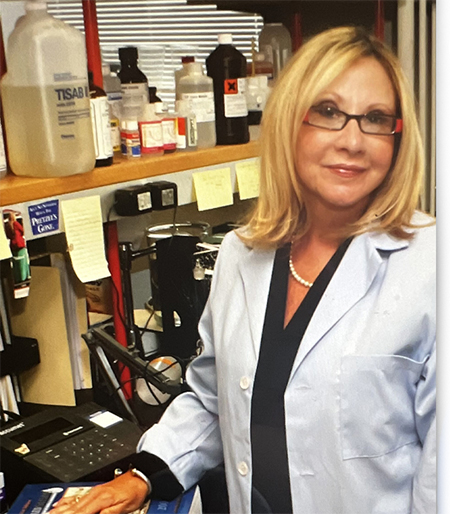
Addressing From All Angles
Through a combination of research, education and community outreach, the Staten Island Breast Cancer Research Initiative (SIBCRI), part of the College of Staten Island’s Center for Environmental Science, is working to address the borough’s breast cancer incidence and mortality rates, which are often among the city’s highest. This year the program is funded by a $50,000 grant from the New York City Council and a $3,000 grant from Staten Island Borough President Vito Fossella. Their work includes a landmark study linking increased breast cancer mortality to residency on Staten Island during puberty, an important finding that adds to research on environmental and developmental risk factors. The study was co-authored by Donna Gerstle, the initiative’s principal investigator.
The Initiative also leads local education efforts, including a podcast series called “Breast Cancer Outreach,” an Instagram account offering tips on screening and risk factors and October’s “Hope” campaign, a collaboration with more than 250 local businesses to distribute educational materials. SIBCRI also engages directly with residents at borough-wide health fairs, focusing on seniors.
Preparing the Next Generation
The City College-Memorial Sloan Kettering (CCNY-MSK) Partnership for Cancer Research, Research Education, and Community Outreach, funded by the National Cancer Institute, trains students in biomedical research and works to reduce cancer disparities in at-risk communities. The partnership was launched in 2002 as a response to troubling statistics, including higher mortality rates among Black women for breast and cervical cancers.
Until August of this year, the year-long program was run by Karen Hubbard, a molecular biologist at City College who studies gene expression during cellular aging. Since her retirement, Associate Professors Bao Vuong and Adriana Espinosa, both of City College, have been running the program. More than 60% of students served by the program come from minority or underserved backgrounds. The program offers summer stipends, career development and seminars, and each fall, students attend the Annual Biomedical Research Conference for Minoritized Scientists. Since expanding in 2013 to include grad and postdoc trainees, the program has supported more than 200 students, many of whom go on to graduate studies and careers in medicine or research.
University-Wide Events
In addition to research, CUNY is building breast cancer awareness though events across its campuses and the city. They include:
- Both the CUNY Central Office and York College will participate in the American Cancer Society’s Making Strides Against Breast Cancer Walk in Central Park on Oct. 19.
- The Central Office is also sponsoring a raffle fundraiser for employees that will also raise money for the American Cancer Society.
- During their volleyball game against Hostos Community College on Oct. 14, Borough of Manhattan Community College will host a Breast Cancer Awareness Night.
- On Nov. 25, BMCC will partner with Mount Sinai to host a mobile mammogram unit, with walk-ins accepted.
The City University of New York is the nation’s largest urban public university, a transformative engine of social mobility that is a critical component of the lifeblood of New York City. Founded in 1847 as the nation’s first free public institution of higher education, CUNY today has seven community colleges, 11 senior colleges and seven graduate or professional institutions spread across New York City’s five boroughs, serving nearly 240,000 undergraduate and graduate students and awarding 50,000 degrees each year. CUNY’s mix of quality and affordability propels almost six times as many low-income students into the middle class and beyond as all the Ivy League colleges combined. More than 80 percent of the University’s graduates stay in New York, contributing to all aspects of the city’s economic, civic and cultural life and diversifying the city’s workforce in every sector. CUNY’s graduates and faculty have received many prestigious honors, including 13 Nobel Prizes and 26 MacArthur “genius” grants. The University’s historic mission continues to this day: provide a first-rate public education to all students, regardless of means or background. To learn more about CUNY, visit https://www.cuny.edu.
By CUNY Communications

